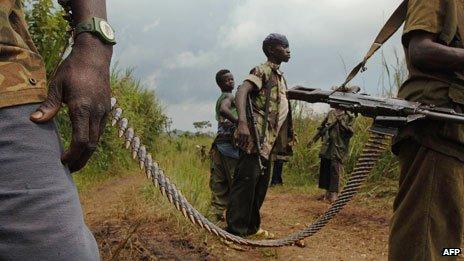Ten years, $900m, one verdict: Does the ICC cost too much?
- Published
- comments

The International Criminal Court has delivered its first judgement, after a decade in existence, and spending nearly $1bn. Critics say it costs too much, but is this fair?
The International Criminal Court (ICC) currently has anannual budget, externalof over $140m (£90m) and 766 staff.
Since its inception, its estimated expenditure has been around $900m (£600m).
With only one completed trial to show for a decade of effort and expenditure, the ICC has faced regular criticism that it sucks in investment with few results to show for it.
Indeed, this is a common refrain at the regular annual meeting in The Hague of the Assembly of States Parties which funds the court.
Some 120 states have ratified the Rome Statute, which established the ICC, and as its paymasters, many cite the slow pace of prosecutions as justification for shaving a few millions off the agreed budget.
But to point to one trial, that of the Congolese militia leader Thomas Lubanga, and argue that it has cost X millions, would be both unfair and misleading.
After all, the ICC budget has to pay for staff salaries, building rental, global travel, intensive investigations in often hostile terrain, translators, for the defence teams, for legal aid for defendants and victims and so on.
The court registry - the administrative heart of the tribunal - pays most of these bills, which explains why it takes up around half of the budget. So the impression, on paper, that the bureaucrats are getting a disproportionate slice of the cake, is misleading.
Are there useful comparisons to be made between the permanent ICC and the so-called ad hoc tribunals set up to investigate and prosecute those who bore the greatest responsibility for the crimes committed in the former Yugoslavia (ICTY) and Rwanda (ICTR)?
The annual budget for the ICTY has gone up 500-fold since it began life in 1993.
Then, it was a modest $276,000 (£176,000). For the two-year period 2010-11, it had risen to over $301m (£192m).
Over this period, more than 60 people have been convicted and proceedings against 40-plus defendants are still ongoing. It employs 869 staff.
The ICTR budget for 2010-2011 was $257m (£165m) and it has 750 posts. It has completed almost 50 trials since it was established in 1994.
But costs for both the former Yugoslavia and Rwanda tribunals are on a clear downward trend now, as they begin the process of winding up their work.
On these figures alone, the ICC comes out poorly in a value for money contest.
But whereas the ad hoc tribunals are geographically focused, the ICC has a global remit and has to engage in often lengthy negotiations with national judicial systems to attempt to meet its goals.
It is also true that the early phases of the Lubanga trial, which began in January 2009, were stretched out by procedural litigation which might be expected in a virgin court.
However, the trial could and should have started many months earlier had not the prosecutor, Luis Moreno-Ocampo refused to disclose hundreds of documents which might have aided the defence case. The stand-off over this issue almost led to Lubanga being freed and the whole trial collapsing.
This points to a failing common to many of the international tribunals, which is a tendency by the prosecution to have one eye on the bar of history by presenting an overblown case, rather than one which is more tightly focused and can be completed within a realistic timescale.
Even staunch defenders of international criminal justice, such as Professor Philippe Sands QC, of University College London, say this is a legitimate concern.
"Yes, there are questions about processes. Are the rules of procedure too cumbersome? Should the indictments be more narrowly drawn?"
However, questions about its budget need to be seen in context, Sands says.
"The costs of the Lubanga trial and the ICC as a whole are small compared to the global aid budget, and completely irrelevant as compared with defence spending."
Even before the current global recession, the mounting costs of international justice and questions over legitimacy had begun to bother governments.
This is why the favoured course over the past decade has been to set up "hybrid" tribunals, which are a collaboration between the international community and individual states.
The prime examples are Cambodia, East Timor, and perhaps most successfully, the Special Court for Sierra Leone, which is dealing with the trial of the former Liberian president Charles Taylor.
But these tribunals are all time-limited. The only permanent criminal court is the ICC and, as such, will continue to attract criticism.
It is, however, a long-term project and arguably still in its early days, and as Sands points out, some things do not come with a clear price tag: "You can't compare the cost of international justice with shopping at a supermarket."
Correction: An earlier version of this report used figures based on an annual budget for the ICTY and ICTR, when in fact they both now operate with a biennial budget. The figures have been amended and an associated graph removed.